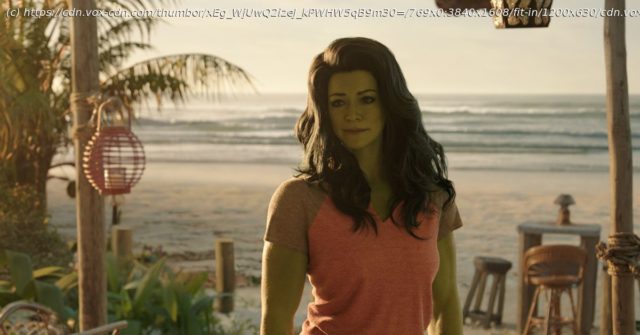The MCU’s version of a legal procedural can be fun as hell.
Beneath She-Hulk’s quippy gags, trippy world-building, and zippy cameos is a heartfelt question: What if you dared to be big?
For Jennifer Walters (Tatiana Maslany), that query comes quite literally as she’s gifted with the powers of a Hulk. To be a Hulk — like her cousin, Bruce Banner (Mark Ruffalo) and his alter ego — means having super strength, near invulnerability, and heightened athletic prowess, among other powers. But those gifts come with a price. Over several Marvel movies, starting with Avengers: Age of Ultron in 2015, we’ve seen Bruce struggle with lack of control, loneliness, and his fear of hurting others. That’s all not to mention the duty, and burden, of using his abilities to protect and save the defenseless.
Jennifer also struggles with the existential questions around what it means to be big, but they affect her differently than they do her cousin, for one obvious reason.
Fictional MCU Earth is unfortunately a lot like the real world. Women are asked to shrink themselves to accommodate those around them. Jen has had a life of being told to stay out of the way, to be anyone but herself.
Within those boundaries, she’s carved out a good-enough life. She’s content. She’s comfortable. Becoming the She-Hulk threatens all of this, and not just because she becomes a lime-skinned anger monster. Her superpowers also spark in her a sense of defiance; they allow Jen to circumvent the rules set for her. Her powers offer Jen a tantalizing prospect: that she could create a life better than the one society has dealt. That is its own kind of scary, especially for someone who has learned to live a tiny life.
As she finds out, it’s not easy to choose to be big. It may even require being brave.She-Hulk isn’t about girlbossing, gaslighting, and gatekeeping superheroism
I suppose you could call She-Hulk: Attorney at Law a “legal procedural” the same way you could call Captain America: Winter Soldier a “political thriller.” It involves a lot of generosity.
In the first four episodes critics were given, there are plots in which Jen has to figure out the legal ramifications of supervillain parole or how to serve a cease and desist to unlicensed magic users. These cases raise some perplexing philosophical questions. Like, what does the MCU want to say about prison reform and rehabilitation? Or how does the law — in which power is mostly abstract — hold actual magic users responsible? It’s a funny conceit, but the legal cases give texture to the MCU and offer a glimpse into the effects that superheroes have on civilian life.
Unfortunately, the show never really goes that deep into how cases are won or, so far, how one might navigate the complicated intersection between nuanced lawyerly duties and more straightforward superhero ones. The good guys are good. The bad guys are bad. The bad guys who are reformed are good now. Most of the time, Jen’s side is the just one.
She-Hulk: Attorney at Law largely works, though, because it’s not actually a legal procedural — it’s more of a comedic origin story. It all hinges on Maslany’s breezy and charismatic portrayal of Jen.
Home
United States
USA — Art She-Hulk: Attorney-at-Law: Power means letting female heroes take up space






